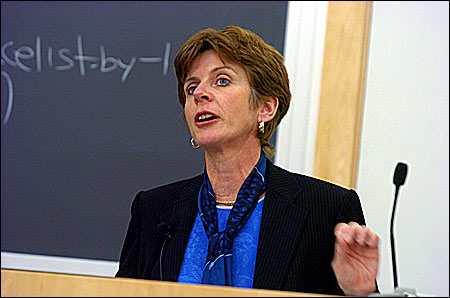Terror online, and how to counteract it
‘Bringing down the Internet’ is not the problem

The prospect of an attack on the Internet has loomed large among the many nightmare scenarios considered since Sept. 11, 2001. But this concern is misplaced, Louise Richardson, executive dean of the Radcliffe Institute for Advanced Study, suggested Feb. 24.
“The fear is that terrorists will bring down the Internet,” Richardson said. But for all the concern about “cyberterrorism,” the Internet is “far too valuable to al-Qaida” and other groups at this point for them to want to disrupt it, she said. “Al-Qaida could not function without the Internet.” The real danger, she suggested, lies in terrorists’ use of the Internet to communicate among themselves and plan operations. “I’d be far more concerned about cyberplanning than cyberterrorism.”
Thus, she exploded what she calls “the myth of cyberterrorism” in a talk at the Maxwell Dworkin building.
Before the Sept. 11 attacks, al-Qaida was a very hierarchical organization “much like a multinational corporation,” Richardson said. United States military actions since then have deprived al-Qaida of its base of operations and its training camps, she said, but also helped disperse the organization more widely. “Our military campaigns in Afghanistan and Iraq have swelled their ranks.” And with the Internet, “they can guide a worldwide movement without meeting their followers or even knowing who they are.”
To counter terrorists’ use of the Internet, Richardson had three recommendations:
- More systematic monitoring of terrorists’ Web sites.
- Efforts to limit terrorists’ use of the Internet, in a way consistent with the First Amendment.
- Use of the Internet against those who do not believe in free speech.She told the audience that she takes the “unpopular view” that it was unwise to cast the fight against terrorism as a “war.””War connotes notions of victory and defeat … but we’re never going to be victorious. … This is a war we can’t win.” Rather, she suggested, the goal should be containment.
She added, “It’s important for these people to be seen as at war with us. … To declare war on al-Qaida is to play into their hands, to elevate their stature.”
Status is important to terrorists. She cited an example from recent Irish history: “In the 1980s, 10 IRA members in a British prison in Northern Ireland starved themselves to death, not to unify Ireland or to drive the British out, but to be accorded the status of political prisoners.”

A student takes notes on a wireless computer tablet during Richardson’s lecture on cyberterrorism. She also said, “Al-Qaida is fundamentally a political threat, not a military one. … A declaration of war actually undermines our ability to defeat terrorism.”
She described al-Qaida as now operating on five different levels: the small group of “professionals,” such as Mohammad Atta, the leader of the 19 who brought down the World Trade Center and attacked the Pentagon; the “amateurs,” such as shoe-bomber Richard Reid; loosely affiliated indigenous terrorist groups like those in Uzbekistan or the Philippines; entities that underwrite terrorist projects that are brought to it, rather the way a foundation makes grants; and finally, at the most diffuse levels, groups that work essentially independently of al-Qaida. “We’re more likely to see more Madrids and Balis than another Sept. 11.”
Terrorists tend to be quite conservative and relatively low-tech in their actual operations, Richardson said.
But terrorists are using the Internet, she said, for psychological warfare, “making threats at absolutely no cost,” and for publicity and propaganda, controlling the content of their message, discussing their goals, and legitimizing violence. “Publicity is the oxygen of terrorism,” she observed. They use the Internet for data mining and fundraising. The Irish Republican Army’s Web site enables one to make donations by credit card, Richardson said. Other organizations have similar arrangements. Web sites are used as vehicles for recruitment by terrorists, and for capturing information about site visitors.
They also provide opportunity for networking – “a virtual umma,” Richardson called it, using the Arabic term for the larger Muslim community. She noted that Europe now has a Muslim population of about 20 million – disproportionately young, male, and unemployed. “The Web has attracted the lonely young Muslim cybernaut and given him a virtual home.”
The Internet also allows terrorists to train recruits and share information, Richardson noted, citing such works as the “Encyclopedia of Jihad” and the “Mujahideen Poison Handbook.” Terrorists use such techniques as encryption, steganography (in which a message is encoded in a document that appears to be something completely unrelated, such as a list or an article or a map. They also use cybercafes to communicate – often storing messages in the “drafts” folder of an e-mail box, where they can be read by many members of an organization without actually being sent out into cyberspace, where they would be traceable.
On the hopeful side, Richardson noted that terrorists’ use of high technology enables their activities to be more readily traced. New technologies are in development to allow for automatic surveillance of Web traffic that would identify patterns without human intervention. After the Madrid bombings last year, the police were able to glean extensive information from a single cell phone found at the scene. And she mentioned the experience of Wall Street Journal reporter Alan Cullison, who happened to acquire from a second-hand dealer a computer that had belonged to al-Qaida. “Captured computers appear to be a far better source of information than captured terrorists.”
Louise Richardson, the Radcliffe Institute’s executive dean since July 2001, has long focused on international security, with special emphasis on terrorist movements. Since the Sept. 11 attacks, her expertise has been much sought out – by the United States Senate, for example.
Her talk, “The Myth of Cyberterrorism: The Internet as a Tool or Target of the Terrorists,” was part of the Distinguished Lecture Series on Computation and Society, sponsored by the Center for Research on Computation and Society.




